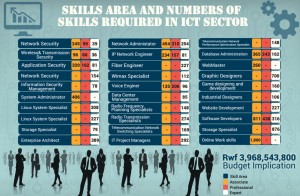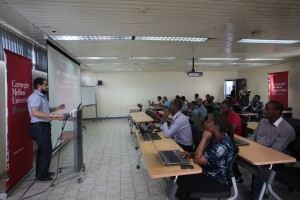Despite progress ICT sector has made in Rwanda, the shortage of highly skilled professionals could slow the pace at which the industry grows and reduce its contribution to productivity in other sectors of economy.
The country expects major projects involving information and communications technologies to deliver Economic Development and Poverty Reduction Strategy 2 and other business opportunities. However, there is concern over the ICT skills gap.

A study on priority skills development for key sectors of the economy, which was conducted by national capacity building secretariat and Ministry of Public Service and Labour titled “Rwanda needs the skills, knowledge and attitudes to support the transition to the middle income country,” observed that ICT sector needs 13,249 qualified and skilled human resources in various areas.
According to ICT sector players interviewed by Rwanda Today, the skills shortage is attributed to poor training at colleges and universities, lack of exposure to high tech equipment, ignorance of latest ICT trends, outdated curriculum, lack of industrial standards certification, lack of curiosity by some students and lack of industrial relations with private sector.
Next year, 1,176 students taking ICT related courses at higher learning institutions will graduate. Most of them have not specialised in key areas.
Patrick Uwitonze is an IT professional who works in software development and networking. He graduated in 2012 but failed to perform some tasks assigned by different employers because they were new to him. He said teaching programmes focus more on theory than practical.
“For instance, I was given a task on networking and I failed to perform it because we did not practice this in school,” he said.
Lack of professional certification
International courses certified by global IT corporations such as Cisco, Microsoft, Oracle are often required on the labour market but practitioners lack them.
Anand Sharma, a general manager of training at TechnoBrain Rwanda Ltd, a subsidiary of international IT training and software development company said: “We find it hard to get many people who have international certifications such as Microsoft, Cisco, Oracle but in Nairobi, Kenya you can find one person who has all the certificates.”
Pierre Celestin Nizeyimana who is in charge of skills development at RDB /ICT support department, said they are planning to sign MoUs with University of Rwanda and workforce development authority to utilise available training facilities to train a bigger number of Rwandans in certain basic international certified IT training.
“The challenge is that very few people are available who are ready to take up technical jobs. When we grow obviously we need people from the local market,” said Mr Sharma.
There have been difficulties in implementing some information systems due to failure of imported software, which sparked a debate in parliament on quality of local ICT professionals.
Members of Parliament scoffed at Oracle software project, which cost former Energy, Water, Sanitation Company $1.1 million but faced implementation challenges due to lack of skills among locals. Some analysts suggested that foreign companies should be compelled in the contracts to train locals when they open shop in the country.

Syed Zain Khan, a lecturer at Carnegie Mellon University said most countries encourage technology transfer whenever a foreign investor establishes a company.
“I worked in Saudi Arabia but they did something unique. We had strict conditions, which required senior managers to train a local Saudi as a parallel manager,” said Prof Zain. Prof Zain added: “At the end of two years, there was nearly 100 per cent skills transfer.”
Hervé Rutagengwa is an award winning entrepreneur, founder of Medmasoft, a software development solutions company. He argued that local professions are competent, but skills transfer is needed to boost their ability and knowledge.
Nsoro Kibogora is an aspiring entrepreneur, noted that local experts are never taken seriously by employers despite their ability to perform some of the tasks.
“There is still mind-set that Africa is still behind in every aspect,” he said.
Some analysts said skills gap is partly caused by outdated curriculum because information technology evolves very fast. Mr Uwitonze also revealed that he has failed to perform an application development assignment at an online media company, because he has not studied game designing, which is also among the skills areas needed in the country.
According to available data, 160 experts in game designing and development area are needed. The IT professional told Rwanda Today, that he led a team of interns who were fresh graduates but they were not hired because “they did not meet the employer’s expectations.”
Some sector analysts suggest technology faculties should have a process to constantly understand industry evolution, meet private sector so as to align their curriculum with the market needs.
Clement Uwajeneza is a founder of Axis, a software development company and a guest trainer at local universities and Klab — an ICT’s innovation and entrepreneurship hub. He said industry relation is not asking companies what they need.
“They should know my current needs. It is about having people who work with industry all the time and understanding current needs and what we think and our projects so as to become up-to-date with industry trends,” said Mr Uwajeneza.
Professor Zain also advocated for building better relationship between universities and businesses. According to him, this can be done by development internship programmes.
This story was supported by a grant from the African Story Challenge, a project of the African Media Initiative, and was was originally published in The East African on 26th December, 2014.
Also by this author:

